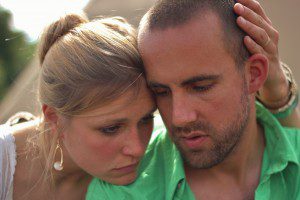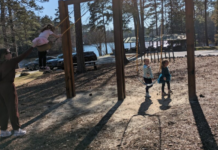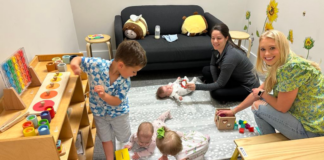
For most parents, the thought that strikes fear in our hearts like no other is losing a child. No parent wants to outlive their children, and whether that child is unborn, an infant, a child, a teenager, or an adult, they are still our babies. The thought of saying an early good-bye is heart-wrenching.
When the unthinkable happens to a friend or family member, we often feel lost. Whether the loss is from difficulties in pregnancy, or cancer, or an accident, we want to make it better … but feel helpless because we can’t turn back time, or speak health and life into what happened.
Here are some things you can do to help someone you love who is walking the road of loss:
Understanding
First, some background information to prepare you for the road:
- You can’t make it better, but you can help to not make it worse.
- Your loved one will never get back to normal. They will find a new normal, but the path to that point is different for each person. You can support them while they find it, but you can’t find it for them.
- Men and women grieve differently. But that doesn’t mean that men don’t grieve. For some more ideas on what men need from the women in their lives when they are grieving, look here.
- Your friend may bow out of social events with no warning. Baby showers, graduations, movies with a certain scene, family gatherings – there are all kinds of triggers for grieving parents. Let them bow out graciously.
- Everyone grieves in their own way. There are no rules, as long as they are not hurting themselves or someone else. Don’t expect them to stick to a certain schedule or way to grieving.
- This is not about you. It is about your friend. There is some great, practical advice in this article. Read it.
- Your role as a friend is to comfort, not to fix.
Words
We always want to know what to say and what not to say. Remember, your goal is to comfort, not to fix. Also, remember that words can be true without being comforting. With that in mind, here are some brief lists to tuck away in your memory:
Words that hurt:
- “At least…” Anything that begins this way seeks to minimize legitimate feelings of loss and sadness because a) it could be worse, or b) someone else has had it worse. Your friend needs to have his or her grief recognized, not minimized.
- “Everything happens for a reason.” In the worst moments of grief, no reason will ever make a parent content with the loss of their child. None. Don’t go there, whatever your personal beliefs are about this.
- “He’s in a better place.” I believe this, I do. But when I lost my daughter Naomi, I didn’t care, because I wanted my baby back. I found great comfort in the words of C.S. Lewis, in his book A Grief Observed. He explains it this way: “If a mother is mourning not for what she has lost but for what her dead child has lost, it is a comfort to believe that the child has not lost the end for which it was created…A comfort to the God-aimed, eternal spirit within her. But not to her motherhood. The specifically maternal happiness must be written off. Never, in any place or time, will she have her son on her knees, or bathe him, or tell him a story, or plan for his future, or see her grandchild.” Don’t brush away your friend’s grief, even with the glories of Heaven.
- “Let me tell you about…” Followed with a story of someone else who had it worse. That doesn’t help.
- “I know how you feel.” Unless you have also lost a child, you don’t know how it feels. And even if you have, you don’t know how this loss feels to your friend.
Words that heal:
Keep it simple and heartfelt.
- “I’m sorry.”
- “I wish you weren’t going through this.”
- “I don’t know what to say, but I am here.”
- “I’ve also….would you like to get together sometime to talk?”
- “I’m praying for you.”
Actions
- Weep. The Bible has apt advice – “weep with those who weep” (Romans 12:15, ESV). There is great comfort in crying together.
- Listen. Listen more than you talk. Ask questions, especially about the memories your friend has of his or her child. Let them talk. Or let them be silent, and then be content to be silent with them.
- Remember. Write the date of your friend’s loss on your calendar for next year, along with a reminder to call them or send them a card in the months or weeks leading up to it. Do the same on the child’s birthday, your friend’s birthday, the major holidays, and Mother’s Day and Father’s Day. Then do it again the next year, when most people will have forgotten.
- Help with the mundane. Meals, laundry, yard work (remember, dads grieve, too). Help with the unexpected costs of a funeral. Offer rides to take surviving children to activities. Don’t ask a grieving parent to call when they need you. They are in survival mode and have no idea what they need. Instead say, “I would like to ______. Would that be okay/would that help?”
One of the tragedies that often accompanies the loss of a child is when the parents also experience the loss of friends who shy away because they don’t know how to come alongside them in their time of tragedy. Don’t be that friend. Instead, be the one who sticks around, who remembers the anniversaries and the hard days, who listens to your friend when they share again how special their child was and what they miss the most, the one who sees them through to the other side of the storm.
Resources
- Sunshine after the Storm – a guide to navigating the road of pregnancy and infant loss, written by men and women who have been there (contributions from Columbia SC Moms Blog writers Kristi Bothur and Alexa Bigwarfe, who also edited it)
- Mommies with Hope – a website for parents grieving the loss of a baby
- “Dear Mom of a Baby in Heaven” – a letter to newly grieving parents from Naomi’s Circle founder Kristi Bothur
- Naomi’s Circle – Columbia-based ministry for parents dealing with the loss of a baby in pregnancy or infancy; includes a list of local support groups in the Midlands
- “Helping a Friend” – a more thorough list of what to do and not do when your friend is going through pregnancy or infant loss, but applicable to losses of children at all ages
- Joy in the Mourning Center for Life Losses – a local organization with the mission of providing programs and people to help individuals and families cope with the different losses of life and return to the joy of living.
- Compassionate Friends – for parents dealing with the loss of a child
- Griefshare – a network of support groups and seminars for walking alongside those going through grief; there are several in the Columbia area
Have you dealt with a loss? What was helpful to you?













Thank you for sharing your insights. When I lost my baby I was so grateful to friends who offered their presence and their prayers. They gave me permission to grieve and be where I needed to be one day at a time. I chose to allow loss to enlarge me and God has transformed my hurt into hope. Now I help others through my grief books and my organization, Hopelifters http://www.hopelifters.com. I believe we go through what we go through to help others go through what we wet through. Now I’m a friend who listens to others who have lost a child.